
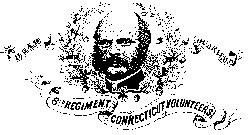

So, You Want to Be a Civil War Reenactor?
Frequently Asked Questions

Who can be a reenactor in your organization?
Anyone who is healthy and fit can participate in living history. Our
primary mission is to be authentic educators by portraying life during
the Civil War. We accept members into our military ranks as soldiers,
and accept as associate members people wishing to portray period musicians and
civilians.
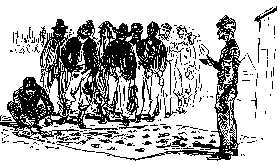
What events and activities do you offer members?
We have activities all year long. Our most active season runs from about
April to October. A normal season includes eight to twelve weekend
events, both local and out-of-state. These activities are battle
reenactment weekends, living history demonstrations, National Park
Service events, company drills, and parade participation. The off-season
is occupied by discussion groups, organizational meetings, and research
activities.
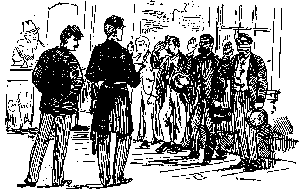
What kind of investment does it take to get started?
All told, the initial investment can run about $1200. This sounds like a
lot of money, but once you have the necessary items, it really can be an
inexpensive hobby. A normal reenactment weekend might then cost pocket
change for registration, gas and tolls for your trip to the event, and a
little food from home. You will spend around $400 for a period
three-band musket. You can figure $400 for your uniform, including hat,
frock, pants, shirts, shoes, and socks. The soldier's accoutrements cost
about $200, including a waist belt, cartridge box, cap box, bayonet,
scabbard, haversack, and canteen. Figure an additional $200 for your
camp equipment, including tent, wool blanket, and rubber blanket, cups,
plates, etc. Those are the essentials. Of course you can spend more,
and you might be able to spend less. We will assist you in getting the
best quality at the best value. Do not attempt to do it on your own.
There are two reasons. The first is that the unit has some requirements,
so you do not want to buy things that you cannot use. The second reason
is that you might get burned on quality or price. Not all sutlers are
your friends.

What should I buy first?
The first thing you should buy is a musket. It should be a period
three-band Springfield or Enfield musket. That should be followed by
shoes, canteen, rubber blanket, cup, and plate. If you require
eyeglasses, you will need a pair of period spectacles. Buy an antique
frame, and have lenses installed. Follow that with the accoutrements.
Then comes the uniform, and the rest of the camp gear. This formula is
to get you on the field the fastest, since most of your comrades have
extras, and might loan you coats, pants, socks, shirts, but not that
many soldiers keep spare muskets. A canteen and rubber
blanket or poncho rank high as essentials for hot and wet weather. This
is a rain or shine hobby, and you must be prepared for the extremes.
Living outside can be uncomfortable otherwise.
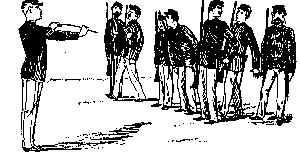
How do I learn to be a soldier?
We train everyone in the ranks, and periodically run schools of
instruction. You can study the material in books like Hardee's, Casey's,
the Customs of Service, and the Army Regulations. This will help you
learn faster. You will be personally instructed in key safety items
prior to your falling in the ranks. But be assured that when you are in
the ranks you will learn. The NCOs will see to that, and your comrades
will help you as well. It is a great education, and you will soon feel
comfortable. Education does not stop there. We continually offer
training, and have an NCO certification program, where soldiers earn
qualification for promotion, then are elected by the membership when
openings occur.
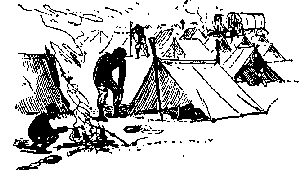
How do you live at these events?
We establish an army camp, centered around company streets, where the
tents of each company are arranged in two long rows, facing each other,
with a space, or the street, separating them. This is the center of the
soldier's life, at least when he is allowed to be there. Here all
cooking, playing, and resting takes place.It is part of the soldiers job
to also work in the camp, to provide wood and water details, and to do guard
and picket duty as assigned by command. If you are a civilian or family
participant, a separate civilian camp is established. In general, we do not allow
civilians to reside on the military street. Visits between the camps are common.
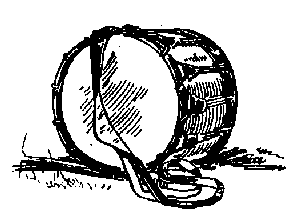
How authentic do I need to be?
We strive for authenticity. We want to portray, to the best of our knowledge,
life in the army. We do not want not be compulsive, but we do want our
appearance to be accurate. We keep camp
authentic 24 hours a day. This means that all 20th century vestiges must
be out of sight at all times. Special attention must be paid to period
shoes and eyeglasses. We strive to do as much first person portrayals as
possible, especially for the public during the day. It is even more fun
to try it for the full 24 hours. It can be a challenge, and an education.
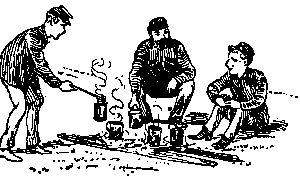
What about eating?
All the food is prepared over the company fire on the company street.
All food preparation must be period. Plastic wrappers, coolers, or
modern containers are restricted to the tents, out of sight. Hot dogs or
Dinty Moore stew are not acceptable. Better yet, many of us learn how
to eat as they did then, and you will be authentic to a tee with little
effort. Salt pork, coffee, hardtack, beans, rice, and some in-season
vegetables will be just the thing. Food is prepared in small three to
five man messes, individually, or as a complete company. There is no
rules for this, the men are left to their own devices, and no one has
starved, or died, yet.
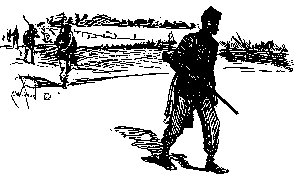
So, how does a typical reenactment weekend go?
Reenactors start showing up at the event site Friday afternoon,
evening, or early Saturday morning. The camps are set up, all the
equipment is organized, and all the modern items are removed from the
camp. It is now the 1860's. Camp fires burn, and coffee is brewed.
Saturday morning revielle comes at dawn, and you wake up to find that
you are in the army, and subject to the hardships and orders of the
officers and NCOs. Breakfast, roll call, drill, details, are the
business of the day. A skirmish or battle may develop with the enemy,
and some hard marching and fighting are involved. The wounded go to
hospital, and the survivors back to camp. Dress parade comes at retreat,
followed by supper, and some campfire songs, and conversations. It all
happens again on Sunday, save for the addition of some church services
or some prayer meetings. Late Sunday afternoon, the event winds to a
close, the camps are struck, and everyone says goodbye to good friends,
and reluctantly head back home to 20th century reality.
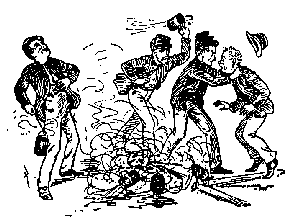
What about the safety of the hobby?
Your safety is the most important thing to everyone in this
organization. We are conscious of the many dangers associated with the
hobby of reenacting. These include the cook fires, axes, black powder
in muskets and cannons, its storage in camps, tent fires,
sharp bayonets, extreme hot weather, extreme cold weather, extreme wet
weather, horses, woodchuck holes, and the list goes on. It is the
responsibility of each and every person in the unit to look out for
all, and to identify and
correct any and all potential problems. We are incorporated, and do
carry insurance to protect us from liability. You can also purchase
medical coverage through the unit at a nominal cost. In general, if
it is hot, you
will be told to drink water. If you lean over the fire, you will be reminded
to be careful. This group approach is the first thing on our
minds at all times.

Why should I join the Eighth Regiment Connecticut Volunteers, Co.A,
Inc.?
We are a group of experienced and inexperienced reenactors alike, who
love the Civil War, the Union, the history of the original Eighth Conn.
Vols. We are a living history organization that has our act together. We
function under a set of by-laws, and are run by an executive board who are
elected annually. We are incorporated, and are not-for-profit. We belong
to the United States Volunteers, a well respected national organization.
We have the respect of, and work with the National Park Service. But
beyond all that, we enjoy the incredible comaradarie that this hobby
creates. We are from all walks of life, and family backgrounds, but when
we do living history together, we are like the boys back then, thrust
into a situation where we all pull together for family, honor, and
country. We look forward to each new face that shares those dreams, and
hope to provide the public insight into your portrayal, and to provide
you the chance at your Civil War moment.

 E-Mail Us for More Information!
E-Mail Us for More Information!
Eighth Regiment Connecticut Volunteers, Co.A, Inc.
8cv@comcast.net


















